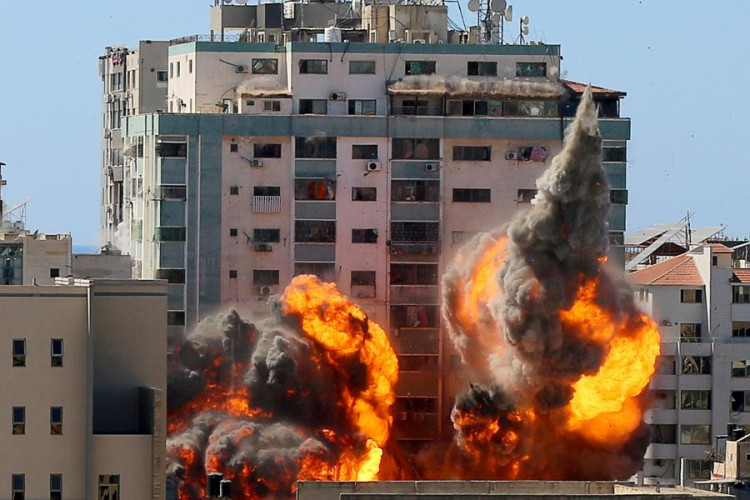Israeli officials believe Mohammed Sinwar, younger brother of the recently killed Hamas leader Yahya Sinwar, is next in line to lead the militant group, several Israeli media outlets reported Friday. The death of Yahya Sinwar, who was one of the masterminds behind the October 7, 2023 attacks on Israel, marks a major shift in Hamas' leadership, but does not spell the immediate collapse of the organization.
Mohammed Sinwar, 13 years younger than his notorious brother, was born in the Khan Younis refugee camp in 1975 after his family was displaced following the 1948 Arab-Israeli War. He grew up in the shadow of his elder brother, who played a central role in the founding of Hamas, and was himself arrested in 1991 for suspected terrorist activities. These early experiences allowed Mohammed to form close ties with senior figures in Hamas, which have kept him prominent in the organization.
Despite limited public knowledge about Mohammed, his operational role in Hamas' military efforts made him one of the Israel Defense Forces' (IDF) most sought-after targets. "You won't find a key event in Hamas's military buildup over the past 25 years in which Mohammed Sinwar wasn't involved," a military source told the Jerusalem Post.
CNN Arabic:
There are several possible successors to Sinwar, who for more than a year has been the most powerful voice in Hamas.
One US official said that if Mohammed Sinwar, Yahya's brother, took over the leadership of Hamas, "the negotiations will completely fail."
A former… pic.twitter.com/IDfdidTQF0 — Clash Report (@clashreport) October 18, 2024
Israeli officials describe Mohammed Sinwar as even more ruthless than his older brother, calling him an "arch-terrorist" and pointing to his direct involvement in the torturous interrogations and killings of Palestinians suspected of cooperating with Israel. "No one in Hamas understands Israel's covert operational patterns better than him. He conducted all the interrogations himself, learning everything from start to finish," an Israeli security official said.
As rumors circulate regarding Hamas' next move, U.S. Secretary of Defense Lloyd Austin noted that Yahya Sinwar's death presents an opportunity for change. Speaking from a NATO summit in Brussels on Friday, Austin said, "The death of Yahya Sinwar could be an extraordinary opportunity to achieve a lasting ceasefire. We'll see how things evolve." However, Hamas remains resolute, insisting that it will not release any hostages until Israel ends its offensive in Gaza.
Israeli media also reported Friday that the IDF does not believe the threat from Hamas will be neutralized until its entire leadership hierarchy is dismantled. While Mohammed Sinwar is expected to take over as the group's leader, other senior officials continue to pose significant challenges for Israel.
Khalil Al-Hayya, a longtime deputy to Yahya Sinwar who led indirect ceasefire negotiations with Israel, remains an influential figure in Hamas. Reports suggest Al-Hayya was in Tehran when another top Hamas leader, Ismail Haniyeh, was killed in July. Khaled Meshaal, who headed Hamas between 2004 and 2017 and currently resides in Qatar, is also seen as a potential successor, though his reappointment may face resistance due to internal divisions within the group.
The short list of possible successors also includes Mahmoud al-Zahar, a senior Hamas official and one of its founders, who survived two Israeli assassination attempts in 1992 and 2003 but has not been seen since the attacks on October 7, 2023. Mohammad Shabana, a senior commander who heads a battalion in Rafah, also plays a key role in the organization, having been instrumental in developing tunnels used in attacks against Israel.
Mousa Abu Marzouk, another founder of Hamas and current deputy chief of its political bureau, could also be a contender for leadership. Marzouk, who once lived in the United States until being deported following his designation as a terrorist by the FBI, has remained a visible figure in Hamas' political strategy.
The death of Yahya Sinwar is the latest in a series of blows to Hamas' leadership by Israeli forces. In recent years, Israel has systematically targeted top Hamas leaders, killing its founder Sheikh Ahmed Yassin in 2004, followed by his successor Abdel Aziz Rantisi just weeks later. Yahya Sinwar's ascent to power came after the killing of Ismail Haniyeh in Tehran earlier this year, and he had solidified his position as the sole decision-maker in Gaza.
Despite these setbacks, Hamas has demonstrated resilience, managing to regroup after each assassination. Observers note that while the loss of Sinwar represents a significant setback, it is unlikely to cripple the organization. "Hamas each time became stronger and more popular, and these leaders became an icon for future generations to continue the journey towards a free Palestine," Hamas' political office said in a statement on Friday.




